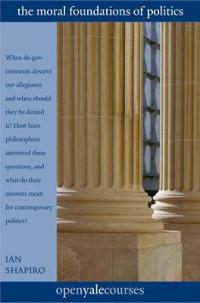Leviathan (Pocket)
avThomas Hobbes, Ian Shapiro, John Dunn
ISBN: 9780300118384 - UTGIVEN: 201007Written by Thomas Hobbes and first published in 1651, "Leviathan" is widely considered the greatest work of political philosophy ever composed in the English language. Hobbes' central argument - that human beings are first and foremost concerned with their own fears and desires, and that they must r[...]
The Moral Foundations of Politics (Häftad)
avIan Shapiro
ISBN: 9780300185454 - UTGIVEN: 201209When do governments merit our allegiance, and when should they be denied it? Ian Shapiro explores this most enduring of political dilemmas in this innovative and engaging book. Building on his highly popular Yale courses, Professor Shapiro evaluates the main contending accounts of the sources of pol[...]
The Real World of Democratic Theory (Häftad)
avIan Shapiro
ISBN: 9780691090016 - UTGIVEN: 200307In this book, Ian Shapiro develops and extends arguments that have established him as one of today's leading democratic theorists. Shapiro is hardheaded about the realities of politics and power, and the difficulties of fighting injustice and oppression. Yet he makes a compelling case that democracy[...]
The Political Writings (Pocket)
avJohn Dewey, Debra Morris, Ian Shapiro
ISBN: 9780872201903 - UTGIVEN: 199310This welcome anthology presents for the first time in one volume John Dewey's major political writings. Ranging throughout his career, the selections display Dewey's philosophical method, his controversial views on war and education, his essential contributions to democratic theory, and his distinct[...]
On Democracy (Pocket)
avRobert A. Dahl, Ian (FRW) Shapiro, Robert A. Dahl
ISBN: 9780300194463 - UTGIVEN: 2015-07Written by the preeminent democratic theorist of our time, this book explains the nature, value, and mechanics of democracy. This new edition includes two additional chapters by Ian Shapiro, Dahl's successor as Sterling Professor of Political Science at Yale and a leading contemporary authority on d[...]
Political Criticism (Övrig)
avIan M. Shapiro
ISBN: 9780520080324 - UTGIVEN: 1992-09-30Since the 1960s, a resurgence of interest in the moral foundations of politics has fueled debates about the appropriate sources of our political judgments. Ian Shapiro analyzes and advances these debates, discussing them in an accessibly style. He defends a view of politics called critical naturalis[...]
Problems and Methods in the Study of Politics (Pocket)
avIan (EDT) Shapiro, Rogers M. (EDT) Smith, Tarek E. (EDT) Masoud
ISBN: 9780521539432 - UTGIVEN: 2004-09The study of politics seems endlessly beset by debates about method. At the core of these debates is a single unifying concern: should political scientists view themselves primarily as scientists, developing ever more sophisticated tools and studying only those phenomena to which such tools may frui[...]
The State of Democratic Theory (Pocket)
avShapiro, Ian
ISBN: 9780691123967 - UTGIVEN: 2005-12-01What should we expect from democracy, and how likely is it that democracies will live up to those expectations? In "The State of Democratic Theory," Ian Shapiro offers a critical assessment of contemporary answers to these questions, lays out his distinctive alternative, and explores its implication[...]
Death by a Thousand Cuts: The Fight Over Taxing Inherited Wealth (Övrig)
avMichael J. Graetz, Ian M. Shapiro
ISBN: 9780691127897 - UTGIVEN: 2006-07-24This fast-paced book by Yale professors Michael Graetz and Ian Shapiro unravels the following mystery: How is it that the estate tax, which has been on the books continuously since 1916 and is paid by only the wealthiest two percent of Americans, was repealed in 2001 with broad bipartisan support? T[...]
Flight from Reality in the Human Sciences, The (Övrig)
avIan M. Shapiro
ISBN: 9780691134017 - UTGIVEN: 2007-11-19In this captivating yet troubling book, Ian Shapiro offers a searing indictment of many influential practices in the social sciences and humanities today. Perhaps best known for his critique of rational choice theory, Shapiro expands his purview here. In discipline after discipline, he argues, schol[...]
Containment: Rebuilding a Strategy Against Global Terror (Övrig)
avIan M. Shapiro
ISBN: 9780691137070 - UTGIVEN: 2008-01-28In this powerfully argued book, Ian Shapiro shows that the idea of containment offers the best hope for protecting Americans and their democracy into the future. His bold vision for American security in the post-September 11 world is reminiscent of George Kennan's historic "Long Telegram," in which [...]
Green Building Illustrated (Häftad)
avFrancis D. K. Ching, Ian M. Shapiro
ISBN: 9781118562376 - UTGIVEN: 2014-03-31Francis D.K. Ching brings his signature style to the topic of sustainable design In the tradition of the classic Building Construction Illustrated , Francis D.K. Ching offers a graphical presentation to the theory, practices, and complexities of sustainable design.[...]













